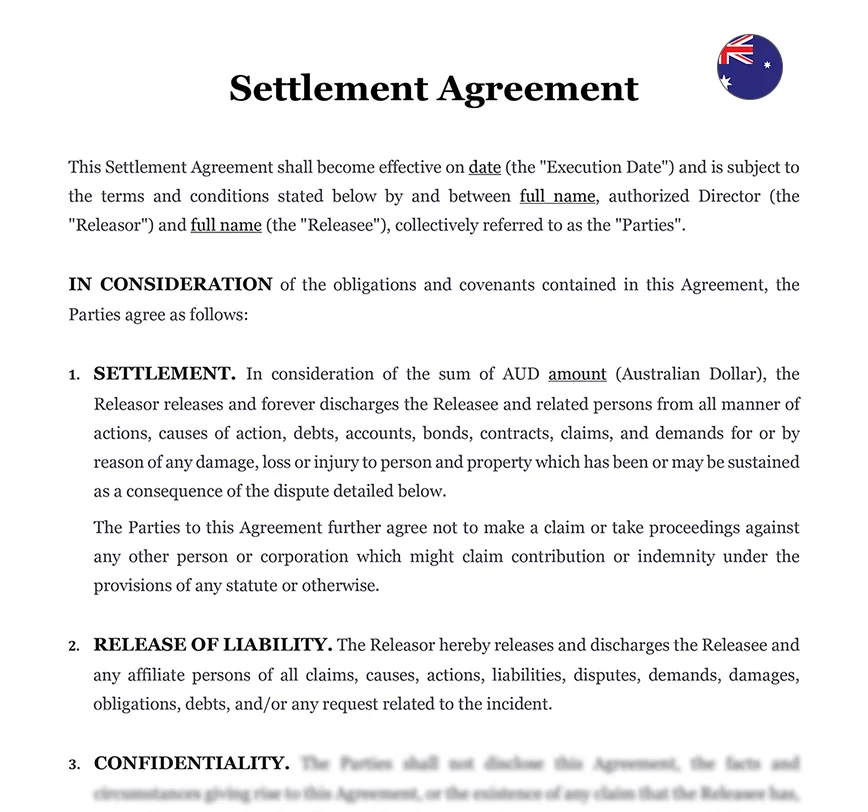The Role of Compromise Agreements in Dispute Resolution
In the landscape of Australian law, disputes are an inevitable part of business and employment relationships. Resolving these disputes efficiently and fairly is crucial to maintaining stability and trust. A Compromise Agreement, often referred to as a Settlement Agreement, is one of the most effective legal tools available for achieving this goal. This agreement allows parties to settle disputes out of court, often saving time, money, and stress while ensuring that both parties’ interests are protected.
Understanding Compromise Agreements
A Compromise Agreement is a legally binding contract between two parties, typically used to resolve disputes without resorting to litigation. The agreement outlines the terms under which a dispute is settled, including any compensation, actions, or concessions agreed upon by both parties. In Australia, these agreements are widely used in both employment and commercial contexts.
1. Types of Disputes: Compromise agreements can be used to resolve various disputes, including employment termination, contractual disagreements, and business disputes. They are particularly common in employment law, where they can settle claims related to unfair dismissal, redundancy, and discrimination.
2. Legal Validity: For a compromise agreement to be legally binding in Australia, it must be in writing, signed by both parties, and include specific terms that clarify the settlement’s scope and the parties’ obligations.
For those interested in the broader application of legal agreements in business contexts, our article on Key Clauses for Designer Contracts in Australia provides insights into drafting contracts that protect your interests.
Key Elements of a Settlement Agreement
The effectiveness of a Settlement Agreement hinges on its content. The agreement must be clear, comprehensive, and tailored to the specific dispute it aims to resolve.
1. Identification of Parties: The agreement should clearly identify the parties involved in the dispute, including any relevant details such as company names, roles, and contact information.
2. Details of the Dispute: A clear description of the dispute, including the issues at hand and any claims made by either party, is essential. This ensures that both parties have a mutual understanding of what is being resolved.
3. Settlement Terms: The agreement must outline the terms of the settlement, including any financial compensation, actions to be taken by either party, and deadlines for fulfilling obligations.
4. Confidentiality Clauses: Often, a compromise agreement will include a confidentiality clause that prohibits the parties from discussing the terms of the settlement with others. This is particularly important in sensitive cases where reputational risk is a concern.
Legal Requirements for Validity
For a Settlement Agreement to be enforceable in Australia, it must meet specific legal requirements. Failure to comply with these requirements can render the agreement invalid.
1. Informed Consent: Both parties must enter the agreement voluntarily, with a full understanding of their rights and the implications of the settlement. Coercion or undue influence can invalidate the agreement.
2. Legal Representation: In many cases, it is advisable for both parties to seek independent legal advice before signing the agreement. This ensures that they fully understand their rights and obligations.
3. Written Agreement: The agreement must be in writing, signed by both parties, and witnessed if necessary. Verbal agreements are generally not enforceable in these cases.
Negotiating a Fair Settlement
Negotiation is a crucial aspect of drafting a Compromise Agreement. Both parties need to agree on the terms, which often requires compromise and a clear understanding of each party’s priorities.
| ➤ Identifying Priorities: Each party should identify their key priorities and what they are willing to compromise on. This might include financial compensation, timelines, or specific actions. |
| ➤ Negotiation Strategies: Effective negotiation strategies include clear communication, a willingness to listen, and a focus on finding a mutually beneficial solution. Legal representatives can play a crucial role in guiding these negotiations. |
| ➤ Avoiding Common Pitfalls: Common pitfalls in negotiation include unrealistic expectations, inflexibility, and failing to fully understand the legal implications of the settlement terms. Parties should be aware of these risks and take steps to avoid them. |











